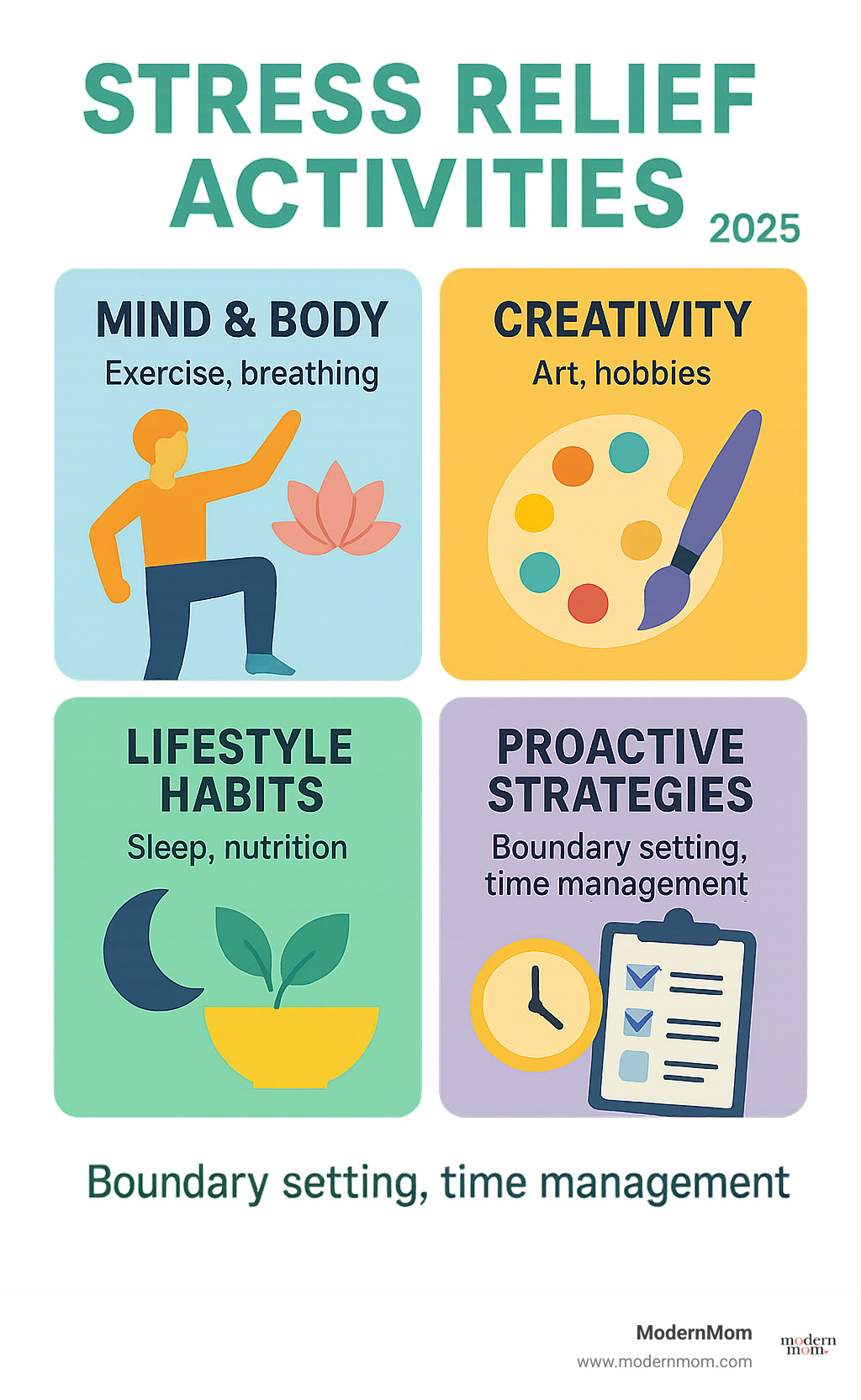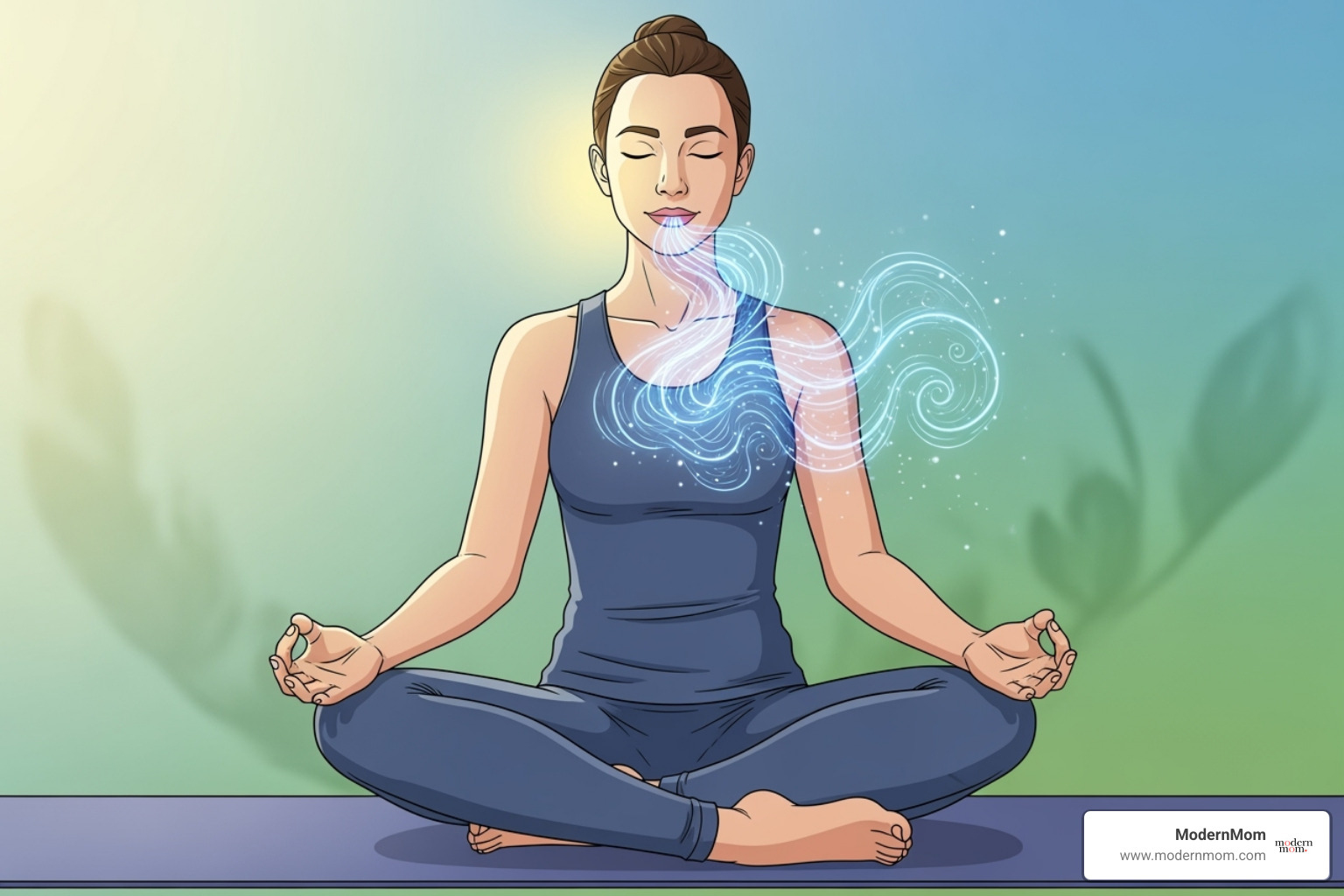
Why Stress Relief Activities Are Essential for Moms
Stress relief activities are techniques that help reduce tension, lower cortisol levels, and improve well-being. As a busy mom, you need quick, effective ways to manage the daily pressures of juggling career, family, and personal life.
Top Stress Relief Activities for Busy Moms:
- Physical Activities: Walking, dancing, yoga
- Mindfulness Practices: Deep breathing, meditation, nature
- Creative Outlets: Coloring, cooking, gardening
- Social Connection: Time with loved ones, cuddling
- Healthy Habits: Quality sleep, balanced nutrition, boundaries
These activities work by releasing endorphins, reducing stress hormones, and activating your body’s relaxation response. For example, one study found that just two days of aerobic exercise per week significantly reduced perceived stress.
You don’t need hours of free time or expensive equipment. Many effective stress relief activities take just 5-10 minutes and can be done anywhere.
From physical activities that boost endorphins to creative pursuits that calm your mind, there are countless ways to find your calm. The key is finding what works for you.
I’m Winnie Sun. After 20 years in financial services, I’ve seen how essential stress relief activities are for mental clarity and physical health. Simple strategies, from a quick breathing exercise to a weekend nature walk, can transform how you handle daily challenges.

Mind & Body Connection: Physical and Mindfulness Practices
Our minds and bodies are deeply connected; when stress shows up, it affects both. We can use this connection to our advantage with stress relief activities that bring us back into balance.
Get Moving: The Ultimate Physical Stress Relief Activities
Moving your body creates happiness by releasing endorphins, a natural mood-improver. Exercise acts like a natural antidepressant. You don’t need to become a marathon runner; a simple walking routine or dancing to your favorite song while folding laundry works wonders. The key is finding movement that feels good.
Aerobic exercise is powerful because it teaches your body to handle stress more efficiently. By practicing the same physical responses your body uses during stress, you become more resilient.
The CDC recommends 150 minutes of moderate-intensity exercise per week, but don’t be intimidated. Break it down into 10- or 15-minute chunks. Even a quick dance party in your kitchen helps.
Practice Mindful Breathing
When stress hits, our breathing often becomes shallow, making us feel more anxious. Diaphragmatic breathing is like a reset button for your nervous system.

Try box breathing: breathe in for four counts, hold for four, breathe out for four, hold for four. Repeat. Studies show deep breathing reduces stress by activating your parasympathetic nervous system, which tells your body to relax. You can do it anywhere, anytime you need immediate calm.
Find Your Flow with Yoga and Meditation
Yoga is one of the most effective stress relief activities because it combines movement, breathing, and mindfulness. Hatha yoga, focusing on gentle poses, is perfect for beginners.
Research shows that yoga can help reduce stress by lowering cortisol, your body’s main stress hormone. Regular practice can also boost GABA, a brain chemical that promotes calmness and mental clarity.
Meditation is about giving your mind a break. Guided imagery can be helpful—imagine a peaceful beach. Even five minutes of focused breathing or using a meditation app can quiet the mental noise. The goal is to create moments of mindfulness where you’re fully present.
Connect with Nature
Science shows why spending time outdoors feels so good. A review of 14 studies found that spending time in a natural setting may help improve well-being and reduce stress. You don’t need to hike mountains; local parks, your backyard, or even sitting under a tree can provide psychological benefits. Green spaces offer natural light, fresh air, and relaxing sounds. Next time you’re overwhelmed, step outside for five minutes. Your body will thank you.
Creative & Fun Stress Relief Activities
Sometimes the best medicine for stress is the simple joy of creating something. When life feels overwhelming, creative stress relief activities can be like hitting a reset button for our minds.
Release Your Inner Artist
The satisfaction of coloring as a kid is still available to us as adults, and it’s incredibly therapeutic. Creative activities like drawing, painting, or coloring can lower cortisol levels and promote relaxation.

Studies show that coloring complex geometric patterns can have a meditative effect and reduce anxiety. It’s not about creating a masterpiece—it’s about the gentle focus that quiets a busy mind. Zentangle drawing is another wonderful outlet that promotes relaxation. The beauty of artistic activities is there’s no wrong way to do them.
Get Hands-On with a DIY Project
Creating something tangible is deeply satisfying. When we’re focused on a DIY project, our minds shift away from worries and into the present moment.
Baking and cooking can be therapeutic. The sensory experience of kneading dough or chopping herbs engages all our senses. You don’t need to be a master chef to enjoy the meditative rhythm of preparing a meal.
Gardening connects us with nature. Digging your hands into soil and nurturing a plant is a grounding experience that eases anxiety. Even watering a few potted herbs can be a peaceful ritual.
For a quick project, try making DIY stress balls. Squeezing them provides a wonderful tactile outlet for pent-up tension.
Turn Up the Music or Get Lost in a Game
Music can instantly transport us to a different emotional space. Whether you’re singing in the car or learning an instrument, musical activities are fantastic for stress relief.
Studies show listening to music can alter brain wave activity and decrease stress hormones. Dancing around the living room counts as both music therapy and exercise!
Games and puzzles offer an escape into a “flow state”—where you’re so absorbed that time seems to disappear. Whether it’s a jigsaw puzzle, a board game, or a mobile game, these activities give our minds something positive to focus on. The key is finding games that are engaging without being stressful.
Laugh It Out
When things feel heavy, laughter is one of the best things we can do. It’s one of the most powerful and free stress relief activities available.
Research shows that laughing lowers cortisol while releasing feel-good endorphins. The Mayo Clinic notes that laughter fires up and then cools down our stress response, leaving us relaxed. It can also lower blood pressure and increase oxygen flow. Whether you’re watching a comedy or sharing funny stories with friends, you’re actively improving your health.
Build Resilience with Healthy Lifestyle Habits
While quick fixes help in the moment, building true resilience means creating healthy habits. These foundational stress relief activities are about building a stronger, calmer you for the long haul.
Fuel Your Body with a Healthy Diet
What we eat greatly impacts how we handle stress. A sugary snack causes an energy crash, and the same rollercoaster happens with stress when we eat poorly. It’s tempting to reach for comfort foods when stressed, but this creates a frustrating cycle. A 2022 review of research suggests that people who follow a diet high in ultra-processed foods and added sugar are more likely to experience higher perceived stress levels.
Instead, think of whole foods like vegetables, fruits, lean proteins, and healthy fats as your stress-fighting allies. They provide steady energy without the dramatic ups and downs. Pay attention to caffeine intake, as too much can amp up stress and disrupt sleep. And don’t forget hydration—when you’re dehydrated, everything feels harder.
Prioritize Quality Sleep
Sleep is magic for stressed-out moms. It’s when your brain and body repair and reset for the next day. Most of us need about 7 to 9 hours nightly, though this can feel like a luxury.

Stress and poor sleep are linked. Breaking this cycle starts with a bedtime routine that signals your body to wind down. Keep your bedroom cool, dark, and quiet. Try to stick to a regular sleep schedule, even on weekends. Finally, put your phone down before bed, as the blue light can trick your brain into thinking it’s daytime.
Lean on Your Social Circle
Sometimes, the best stress relief activities involve other people. Sharing struggles with someone who gets it is incredibly powerful. Research backs this up: a 2019 study found that people with less social support experienced higher stress levels. When we’re isolated, worries tend to grow.
Social connection works as a stress reliever by providing distraction, perspective, and a feeling of being less alone. Don’t underestimate the power of physical touch. A hug from a partner or snuggling with your kids releases oxytocin, the “cuddle hormone,” which naturally lowers cortisol, blood pressure, and heart rate.
Spend Time with a Furry Friend
Pets can be like four-legged therapists. A dog’s greeting or a cat’s purr can melt away tension. Having a pet may help reduce stress and improve your mood. When you pet your furry friend, your body releases oxytocin, which lowers cortisol and helps regulate your heart rate. Pets also keep us present and offer unconditional love.
Manage Your Screen Time
Our phones can be both a blessing and a curse, and often a major source of stress. A 2021 review found that excessive smartphone use is linked to higher stress levels. Constant notifications and the endless scroll of information can leave our brains feeling overwhelmed.
Setting boundaries with technology is a crucial modern stress relief activity. Try creating screen-free zones, like during dinner or for the hour before bed. Turn off non-urgent notifications. Consider a digital detox, even for a few hours. You might be surprised how much mental space opens up.
Take Control: Proactive Stress Management Strategies
Sometimes the best stress relief activities are proactive, helping you get ahead of stress before it hits. These strategies build a stronger foundation to handle life’s curveballs with more grace.
Master the Art of Saying ‘No’
Saying “no” is one of the most loving things we can do for ourselves and our families. As moms, we’re wired to say yes, but over-commitment is a fast track to burnout. Setting boundaries isn’t selfish; it’s essential. When we protect our time and energy, we create space for what truly matters. Every “no” to something draining is a “yes” to something life-giving. Assertiveness takes practice, but remember: you can’t pour from an empty cup.
Tackle Your To-Do List (and Procrastination)
Your never-ending to-do list is a major source of stress. Procrastination can cause stress, creating a cycle where we avoid overwhelming tasks, which makes them more stressful. The secret is to work smarter, not harder. Start by prioritizing your tasks. What must happen today? What can wait? What can you delegate or eliminate? Breaking down large tasks into bite-sized pieces makes them less intimidating. These small wins create momentum. Time management can be as simple as setting a 15-minute timer for one small task.
Journaling and Gratitude: Simple Stress Relief Activities for Your Mind
Some of the most powerful stress relief activities are free and take just minutes. Journaling is like having a conversation with a non-judgmental friend. Expressing your emotions on paper—frustrations, worries, or random thoughts—can provide incredible relief by clearing out mental clutter.
Gratitude journaling shifts our focus from what’s wrong to what’s right. Research shows grateful people enjoy better mental health and lower stress. Jotting down three things you’re thankful for each day can transform your perspective. This practice becomes a positive outlet for appreciating good moments.
Consider Supplements Wisely
You might wonder if supplements can offer additional support for stress relief. Some research suggests certain supplements may help, but it’s crucial to be thoughtful. Magnesium is one that shows promise; supplementing with magnesium has been linked to decreased stress in chronically stressed people. Other options include Ashwagandha, an adaptogenic herb, and L-theanine, an amino acid that promotes relaxation. However, supplements aren’t magic bullets and work best with other healthy habits. Always consult with a doctor before adding any supplements to your routine.
Know When to Seek Professional Help
Sometimes, our own stress relief activities aren’t enough, and that’s okay. Recognizing when you need support is a sign of wisdom. If stress feels overwhelming, persistent, or is impacting your daily life, consider therapy or counseling. A professional can provide personalized strategies and coping mechanisms, like cognitive behavioral therapy (CBT), to help you manage stress more sustainably. Seeking help isn’t giving up—it’s taking control.
Frequently Asked Questions about Stress Relief
As busy moms, we all have questions about finding realistic ways to manage stress. Here are answers to some of the most common concerns.
What are the quickest stress relief activities I can do in 5 minutes?
When you need fast relief, some of the most effective techniques take just minutes. Here are a few to try:
- Deep breathing: A few minutes of focused diaphragmatic breathing can calm your nervous system almost instantly.
- Stepping outside: Even 10 minutes in nature can improve mood and reduce stress. A quick walk or just opening a window for fresh air helps.
- Listen to one favorite song: Music has an incredible power to shift our mood. Keep a “mood rescue” playlist handy.
- Quick stretching: Release tension in your neck, shoulders, and back with a few simple stretches.
- Laughter: Watch a funny video or call a friend who makes you giggle. Laughter truly is medicine.
How does diet really affect my stress levels?
What you eat directly impacts how you handle stress. Processed foods and added sugar cause blood sugar to spike and crash, which can trigger anxiety and irritability that feels like stress. This can increase cortisol levels and create a vicious cycle.
On the other hand, whole foods like leafy greens, nuts, and lean proteins provide steady energy and support your body’s natural stress response. Be mindful of caffeine, as too much can amp up anxiety and disrupt sleep. Proper mood regulation works best when we give our bodies steady, nourishing fuel.
Can creative hobbies actually reduce stress?
Yes, and science backs this up. When you get lost in a creative project, you enter a “flow state”—a zone where worries fade into the background. This focus on the present moment is a form of mindfulness. The repetitive motions in many creative activities, like knitting or coloring, have a meditative effect that can lower cortisol levels.
Creative hobbies also provide a healthy distraction from life’s pressures. Plus, the sense of accomplishment you feel after finishing a project is a powerful mood booster that builds resilience. Whether it’s doodling or trying a new recipe, these activities are a two-for-one deal on self-care.
It’s Not About Perfection
Finding your calm as a busy mom isn’t about perfection; it’s about finding what works for you and your family. We’ve explored dozens of stress relief activities that can fit into even the most packed schedules. From five-minute breathing exercises to creative outlets, you now have a toolkit filled with practical solutions.
You don’t need to transform your life overnight. Small, consistent choices make the biggest difference. Maybe it’s starting your day with three deep breaths, saying no to an extra commitment, or dancing to one song while making dinner. What matters most is consistency over intensity. A ten-minute walk you actually take is better than a two-hour gym session you can’t manage.
These moments of self-care aren’t selfish—they’re essential. When you take care of yourself, you model healthy habits for your children and have the energy to show up fully for them.
On overwhelming days, be gentle with yourself. Try one small thing. Every step counts, and tomorrow is a fresh start. Building resilience through these stress relief activities is like strengthening a muscle. The more you practice, the more natural these healthy responses become. You’re not just surviving motherhood—you’re creating a life with more joy and peace.
We at ModernMom are cheering you on. You’ve got this.
Find more tips for living a healthy life
The post 18 Ways to Melt Away Stress: Your Ultimate Guide to Calm appeared first on ModernMom.

